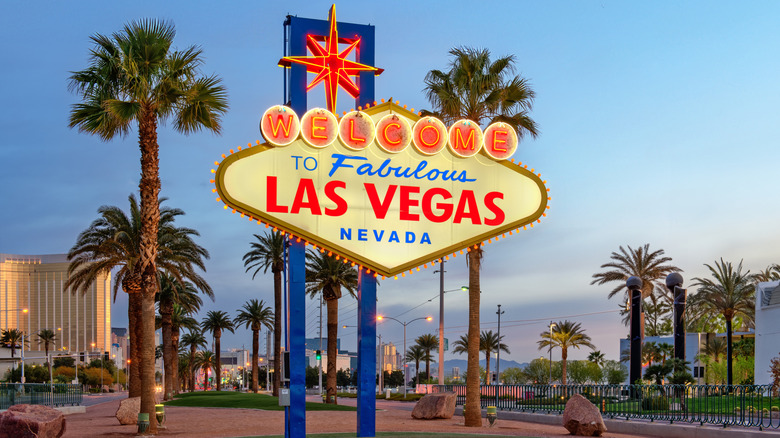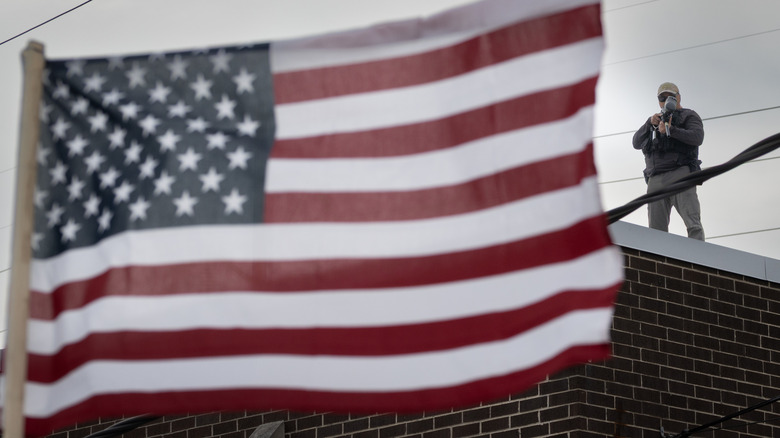The Reasons Why Tourism In The US Is Seeing Such A Dramatic Decline
In 2025, the world's biggest travel and tourism sector, the United States, was the only one of 184 countries projected to have a decline in international visitor spending. Those were the findings of the World Travel & Tourism Council in its annual report on travel's global economic impact. According to the report, domestic travel accounted for almost 90% of all U.S. tourism in 2024. While international visitors only make up a small piece of the pie, their diminished presence could still cost the country billions of dollars in tourism revenue.
Tourism Economics had originally projected that the U.S. would see an 8.8% increase in international visitors in 2025. In April, after President Donald Trump's proclamation of sweeping tariffs against U.S. trading partners, the economics company revised that prediction to a 9.4% decrease. The country now stands to lose twice as many visitors as it was expected to gain as the global spotlight shines on anti-immigration rhetoric and enforcement, safety concerns, and stronger barriers to entry. Even with the draw of Las Vegas and Disney World, states like Nevada and Florida have logged a noticeable tourism decline (11.3 and 8.7%, respectively, for the first nine months of the year, per Travel and Tour World).
This is more than just the tourism market retracting after a post-pandemic boom, or summer travelers being reconditioned for later "coolcations" by record-breaking heat. On social media, viral "ghost town" stories circulated about Vegas and Disney alike in 2025. Both places have faced a chorus of complaints about their "nickel-and-diming" of guests, as their once-affordable resorts have become luxury destinations. In September, Vegas ran its first-ever city-wide sale to lure back visitors disillusioned with its hidden resort fees. Big discounts through October also courted travelers who think Disney vacations are too expensive now.
There's a strong dollar, a boycott, and a 'Trump slump'
Economic uncertainty in America may have fueled a travel slowdown in some domestic hotspots, but U.S. travel overseas has been hitting record highs, and not just among gig-tripping Taylor Swift fans. Conversely, the dollar's strength may have caused some international visitors to look for a more beneficial exchange rate outside the U.S. Countries like Canada, Germany, South Korea, and France all rank among the top 10 in visitor arrivals. For the first half of 2025, however, these countries saw some of the sharpest drops in arrivals year-over-year, based on International Trade Administration data.
Some Canadians have boycotted U.S. travel and products following President Trump's threats to annex Canada and make it America's 51st state. It's no coincidence, perhaps, that Las Vegas has suffered without the regular inflow from Canada, its largest source of international visitors (per the Las Vegas Convention and Visitors Authority). Derek Stevens, the CEO of Circa Resort & Casino, told Fox News, "We're missing some of our Canadian friends who aren't visiting this year." Secretary-treasurer Ted Pappageorge also said in The Guardian that members of Nevada's largest labor union, Culinary Workers Union Local 226, refer to the tourism decline as a "Trump slump."
By July 2025, visitors from Denmark were down 19%, as some joined the boycott over Trump's threats to annex Greenland, an autonomous Danish territory. Alongside ICE (Immigration and Customs Enforcement) raids — and incidents where European tourists were detained — countries like the U.K. and Germany have issued travel warnings for the U.S. All of this hasn't stopped some Canadian baseball fans from crossing the border to see the Toronto Blue Jays play in the World Series, though. Yet Seattle tour guide Joe Koenen told CNN that others calling to cancel their trips "explicitly told me that it was because of the policies and the behavior of our current president."
Concerns have intensified over safety and ease of travel
In April 2025, U.S. Travel Association president Geoff Freeman testified before a House of Representatives committee that America ranked second to last in global competitiveness among 18 top travel markets. Citing a joint Euromonitor report that predated the second Trump administration by a year, Freeman said, "Only China finished behind the United States." This suggests that heightened geopolitical tensions in 2025 may have compounded some existing problems, such as security and facilitation of travel (two areas where the U.S. fell short in the report).
One specific security concern the association's report highlights is "the fear of gun violence," which it says "remains highly influential in global perceptions of the U.S." In the report, the European Aviation Safety Agency is quoted as saying, "We hear about mass shootings all the time, and some people are scared by it." As for facilitation, some new travel policies don't make it easy for tourists on visas to visit the States without overcoming certain barriers to entry.
Mexico, for instance, is not one of the 42 countries included in America's Visa Waiver Program, allowing foreign nationals entry for up to 90 days of tourism or business travel. Its citizens, like Canada's, must usually apply for a visa beforehand. The process could once be done via a convenient "dropbox" system, but as of October 2025, it now requires an in-person interview with a consular officer for most applicants. There's also a new $250 visa integrity fee, which comes in addition to the standard $185 processing fee. That means travelers will already be $435 in the hole before they even book a flight or hotel. Amid anti-immigrant rhetoric and mass deportations, the extra cost and hassle may simply make a U.S. vacation more trouble than it's worth.


